Eating fruits is an effective way to lose weight and improve overall health. Fruits are low in calories, high in fiber, and packed with essential vitamins and minerals. Incorporating fruits into a healthy diet can help individuals achieve their weight loss goals while providing numerous health benefits.
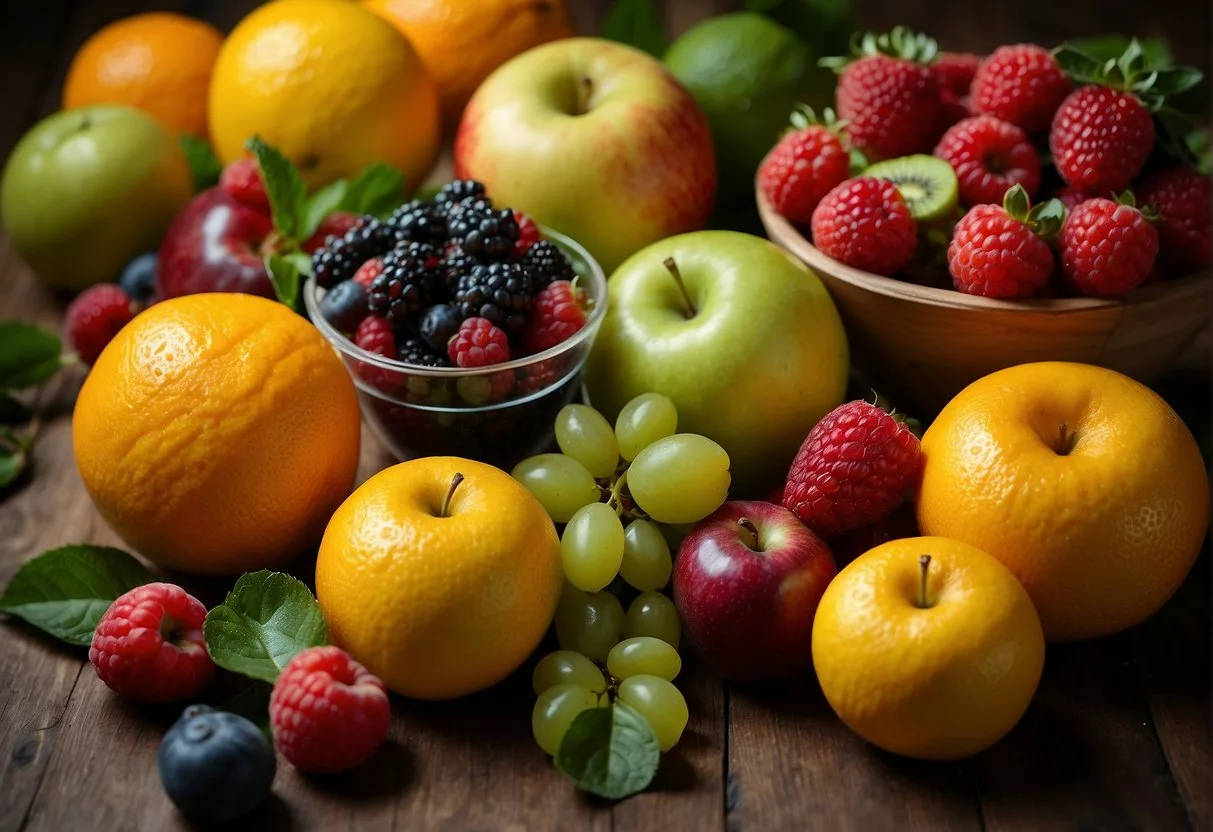
Understanding Weight Loss and Nutrition
Fruits are an essential part of a healthy and balanced diet. They are rich in fiber and water, which helps individuals feel full for longer periods, reducing the chances of overeating. Eating fruits can also help regulate blood sugar levels and improve digestion, leading to better weight management.
Top Fruits for Weight Loss
Not all fruits are created equal when it comes to weight loss. Some fruits are high in sugar and calories, while others are low in calories and high in fiber. Berries, grapefruit, apples, pears, and kiwifruit are some of the best fruits for weight loss. These fruits are low in calories and high in fiber, making them ideal for those looking to shed a few pounds.
Key Takeaways
- Incorporating fruits into a healthy diet can help individuals achieve their weight loss goals while providing numerous health benefits.
- Eating fruits can help regulate blood sugar levels and improve digestion, leading to better weight management.
- Berries, grapefruit, apples, pears, and kiwifruit are some of the best fruits for weight loss due to their low calorie and high fiber content.
Understanding Weight Loss and Nutrition
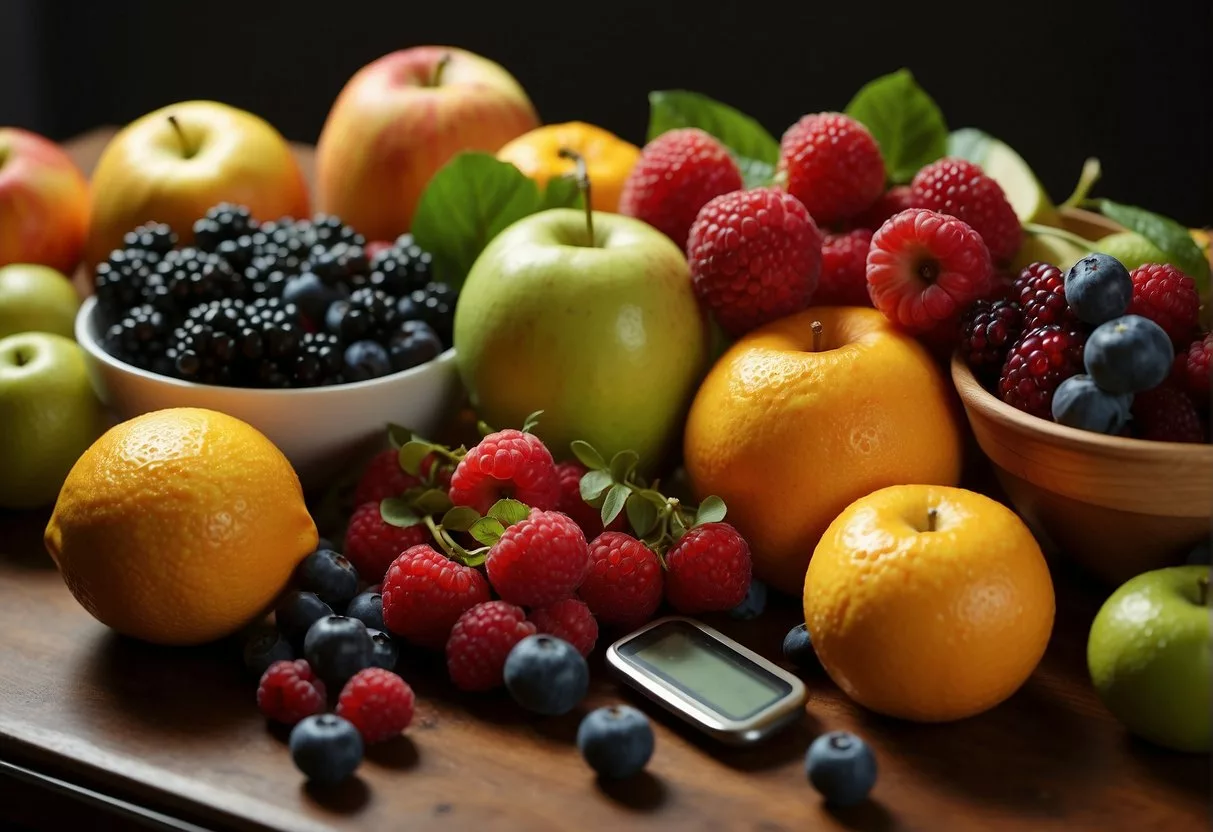
Role of Diet in Weight Loss
Diet plays a crucial role in weight loss. It is important to consume a balanced diet that provides all the necessary nutrients, vitamins, and minerals. A diet that is high in calories and unhealthy fats can lead to weight gain and various health problems.
Importance of Nutrients and Vitamins
Nutrients and vitamins are essential for maintaining a healthy weight. Vitamin C, vitamin K, folate, and protein are important for weight loss. These nutrients help in building muscle mass, boosting metabolism, and burning fat.
Balancing Sugar and Fiber Intake
Balancing sugar and fiber intake is crucial for weight loss. Consuming natural sugar in fruits is better than consuming processed sugar. Fiber-rich foods help in keeping the stomach full for a longer time, reducing hunger pangs, and aiding in weight loss.
Hydration and Weight Management
Hydration is important for weight management. Drinking water helps in flushing out toxins from the body, reducing bloating and water retention, and aiding in weight loss. Foods with high water content like fruits and vegetables also help in hydration and weight management.
The Impact of Calories and Fat on Diet
Calories and fat play a significant role in weight loss. It is important to consume a diet that is low in calories and healthy fats. Consuming a diet that is high in calories and unhealthy fats can lead to weight gain, high blood sugar, and various health problems.
In conclusion, consuming a balanced diet that provides all the necessary nutrients, vitamins, and minerals is important for weight loss. Balancing sugar and fiber intake, staying hydrated, and consuming a diet that is low in calories and healthy fats can aid in weight loss and lead to a healthy lifestyle.
Top Fruits for Weight Loss
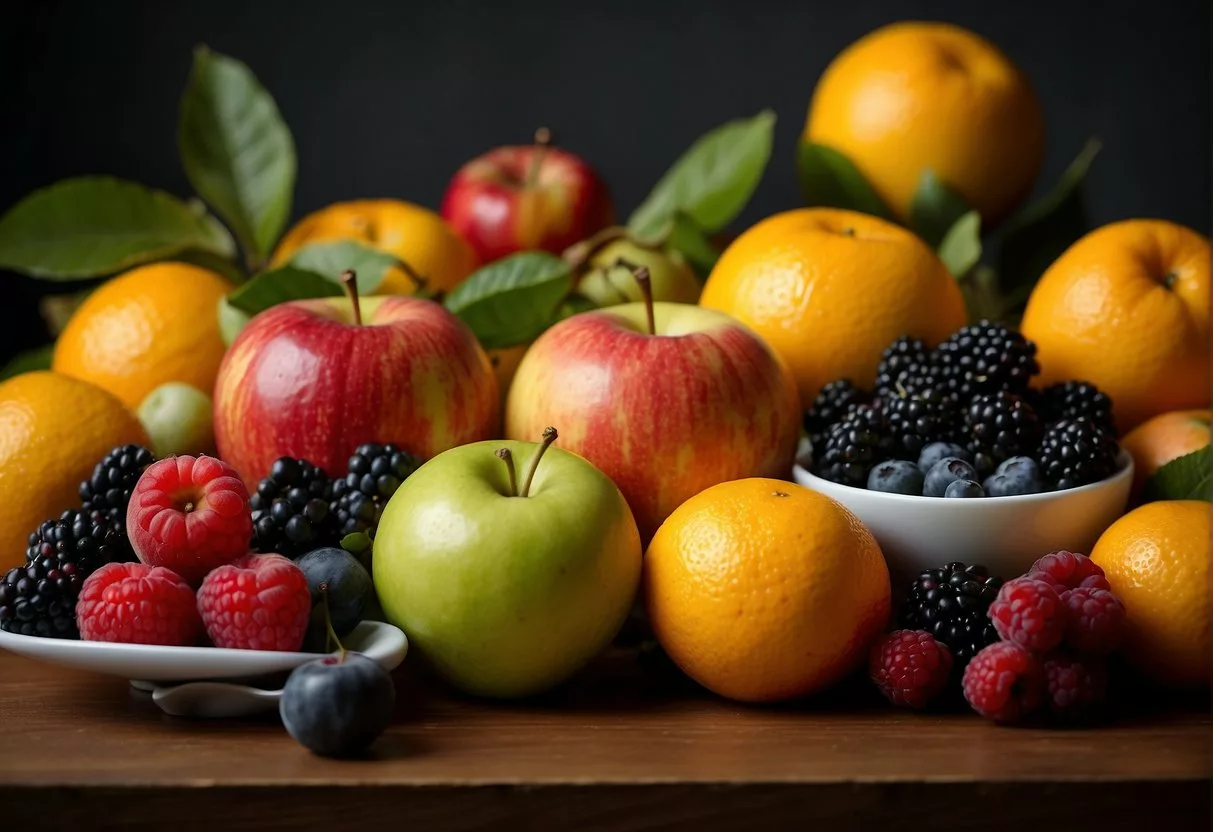
When it comes to weight loss, incorporating fruits into your diet can be a great way to help you achieve your goals. Fruits are low in calories and high in nutrients, making them a healthy and satisfying snack option. Here are some of the top fruits for weight loss:
Berries: Nutrient Powerhouses
Berries such as raspberries and blueberries are packed with antioxidants and fiber, making them a great choice for weight loss. These fruits are also low in calories, with a cup of raspberries containing only 64 calories. Adding berries to your diet can help you feel full and satisfied while also providing a range of health benefits.
Citrus Fruits: Vitamin C and Hydration
Citrus fruits like oranges are rich in vitamin C, which can help boost your immune system and promote healthy skin. These fruits are also high in water content, making them a great choice for hydration. Eating citrus fruits can help you feel full and satisfied while also providing a range of health benefits.
Apples and Pears: Fiber-Filled Snacks
Apples and pears are high in fiber, making them a great choice for weight loss. These fruits are also low in calories, with a medium-sized apple containing only 95 calories. Eating apples and pears can help you feel full and satisfied while also promoting healthy digestion.
Stone Fruits: Low-Calorie Sweetness
Stone fruits such as cherries and peaches are low in calories and high in natural sweetness, making them a great choice for weight loss. These fruits are also high in water content, which can help you stay hydrated. Eating stone fruits can help you feel full and satisfied while also satisfying your sweet tooth.
Melons: Hydrating and Low in Calories
Melons such as watermelon, cantaloupe, and honeydew are high in water content and low in calories, making them a great choice for weight loss. These fruits are also packed with nutrients, including vitamins A and C. Eating melons can help you feel full and satisfied while also promoting healthy hydration.
Tropical Fruits: Exotic and Nutrient-Dense
Tropical fruits such as pineapple, mango, and kiwi are packed with nutrients, including vitamin C and fiber. These fruits are also high in natural sweetness, making them a great choice for satisfying your sweet tooth. Eating tropical fruits can help you feel full and satisfied while also providing a range of health benefits.
Avocado: Healthy Fats and Satiety
While technically a fruit, avocado is often used as a healthy fat source in the diet. Avocado is high in fiber and healthy fats, which can help promote satiety and keep you feeling full for longer. Adding avocado to your diet can help you feel satisfied while also providing a range of health benefits.
Incorporating Fruits into a Weight Loss Diet
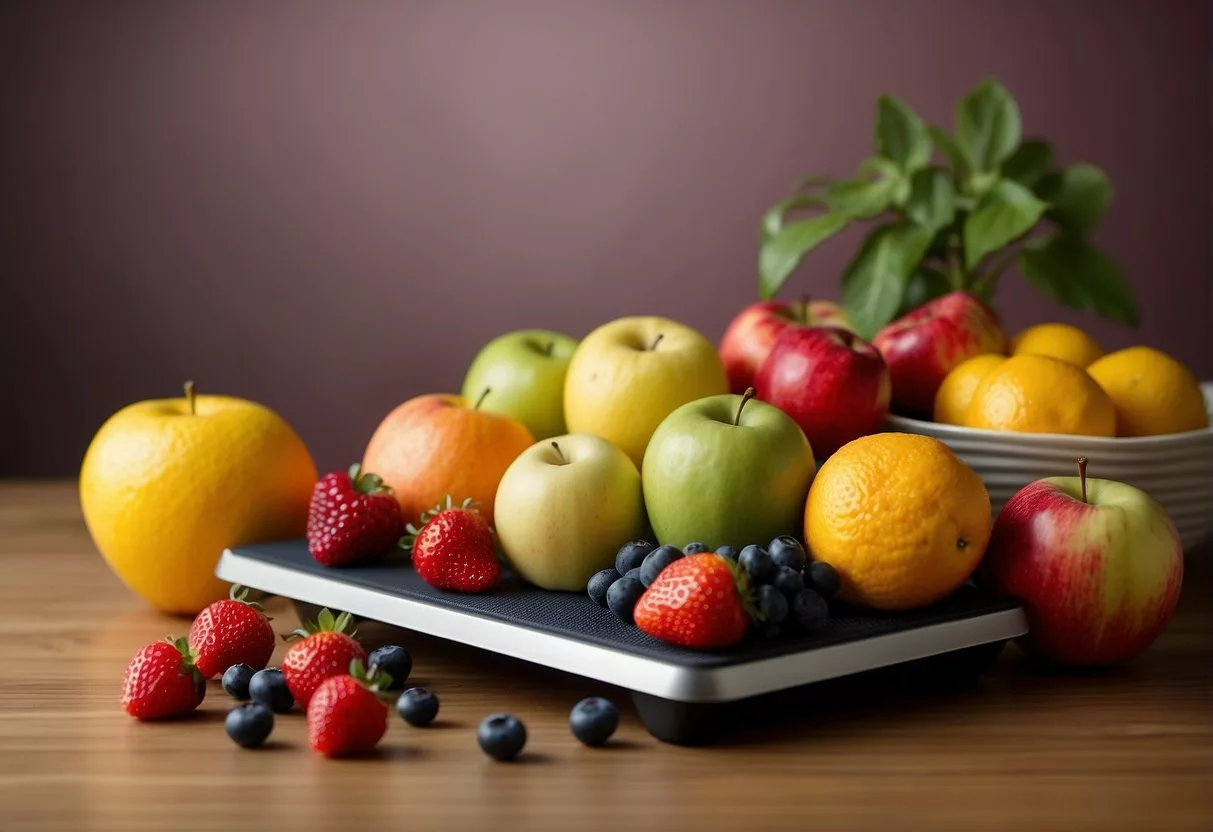
When it comes to weight loss, incorporating fruits into one’s diet can be an effective way to stay healthy and satisfied. Here are some tips for incorporating fruits into a weight loss plan.
Fruit-Based Breakfast Ideas
Starting the day with a fruit-based breakfast can help individuals feel full and energized. Some ideas include adding berries to Greek yogurt or blending a smoothie with fruits like bananas and berries.
Healthy Fruit Snacks and Desserts
Fruits can also make for healthy snacks and desserts. Apples and pears can provide natural sweetness without added sugar, and berries can be added to salads for a refreshing and flavorful touch.
Creating Balanced Meals with Fruits
Incorporating fruits into balanced meals can help individuals stay full and satisfied. Pairing fruits with protein and vegetables can provide a well-rounded meal. For example, a salad with chicken, nuts, and berries can provide protein, healthy fats, and natural sweetness.
Understanding Portion Sizes and Frequency
While fruits can be a healthy addition to a weight loss plan, it’s important to understand portion sizes and frequency. Consuming too many fruits can lead to excess calories and sugar intake. Individuals should aim for 1.5-2 cups of fruit per day and choose low-sugar fruits with a low glycemic index.
Alternatives to High-Sugar Fruits
For individuals looking to limit sugar intake, there are alternatives to high-sugar fruits. Some options include berries, citrus fruits, and melons. These fruits are lower in sugar and can still provide important nutrients for overall health.
Incorporating fruits into a weight loss plan can provide important nutrients and help individuals stay full and satisfied. By understanding portion sizes and choosing low-sugar fruits, individuals can create a healthy and balanced diet that supports their weight loss goals.
Health Benefits Beyond Weight Loss
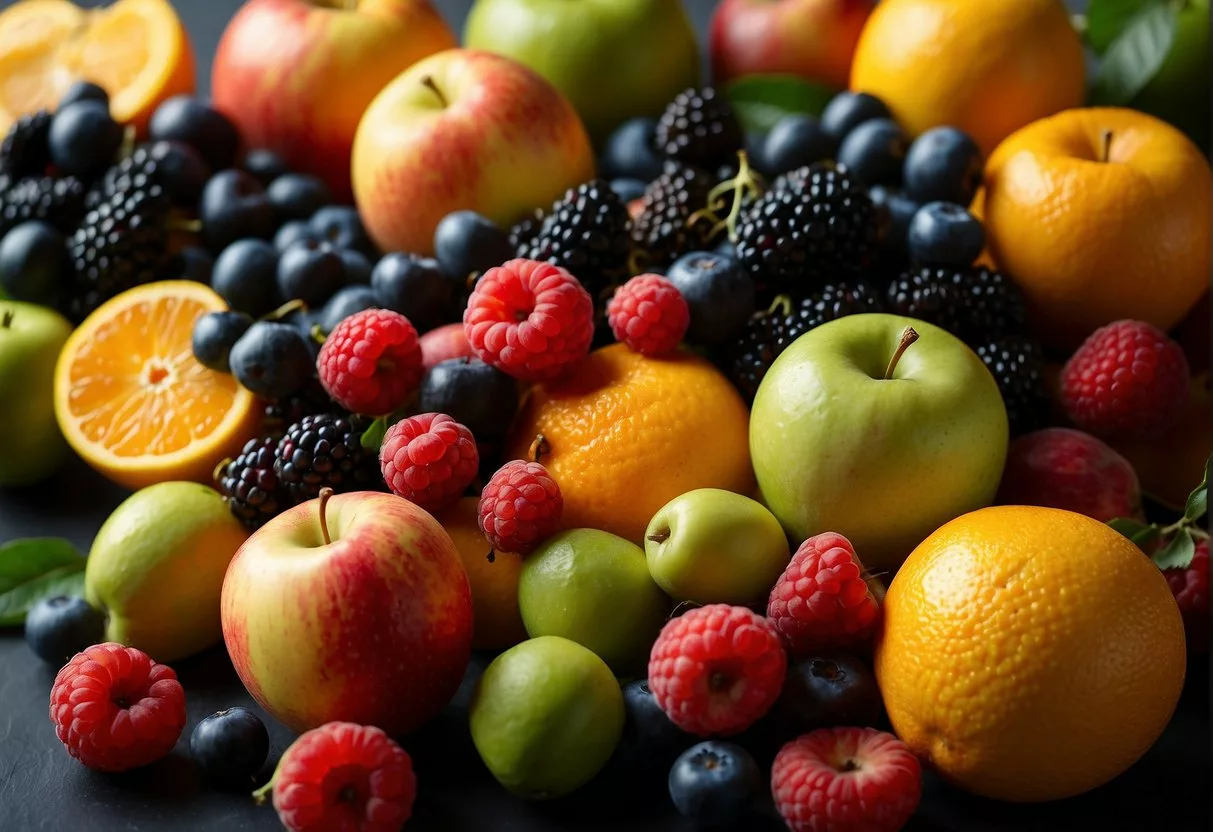
Fruits are not only beneficial for weight loss, but they also offer numerous health benefits that can contribute to overall health. Here are some of the health benefits of fruits beyond weight loss.
Cardiovascular Health and Fruits
Fruits are rich in nutrients such as vitamins, minerals, fiber, and antioxidants, which are beneficial for the heart. Studies have shown that consuming fruits can reduce the risk of heart disease, lower blood pressure, and improve cholesterol levels. For example, pomegranate, berries, and citrus fruits are rich in antioxidants that can help reduce inflammation and improve blood flow.
Fruits and Digestive Health
Fruits are a good source of fiber, which is important for digestive health. Fiber helps to keep the digestive system healthy and prevent constipation. Fruits such as apples, pears, and bananas are rich in fiber and can help regulate bowel movements.
Fruits in Diabetes and Prediabetes Management
Fruits are a good source of carbohydrates, which can affect blood sugar levels. However, most fruits have a low glycemic index, which means they do not cause a rapid increase in blood sugar levels. Studies have shown that consuming fruits can improve blood sugar control in people with diabetes and prediabetes.
Antioxidants and Inflammation Reduction
Fruits are rich in antioxidants, which can help reduce inflammation in the body. Inflammation is linked to various health conditions such as cancer, aging, and stress. Fruits such as blueberries, cherries, and grapes are rich in antioxidants that can help reduce inflammation and promote overall health.
In conclusion, fruits offer numerous health benefits beyond weight loss. Including fruits in your diet can help improve cardiovascular health, digestive health, blood sugar control, and reduce inflammation.
Lifestyle Considerations for Effective Weight Loss
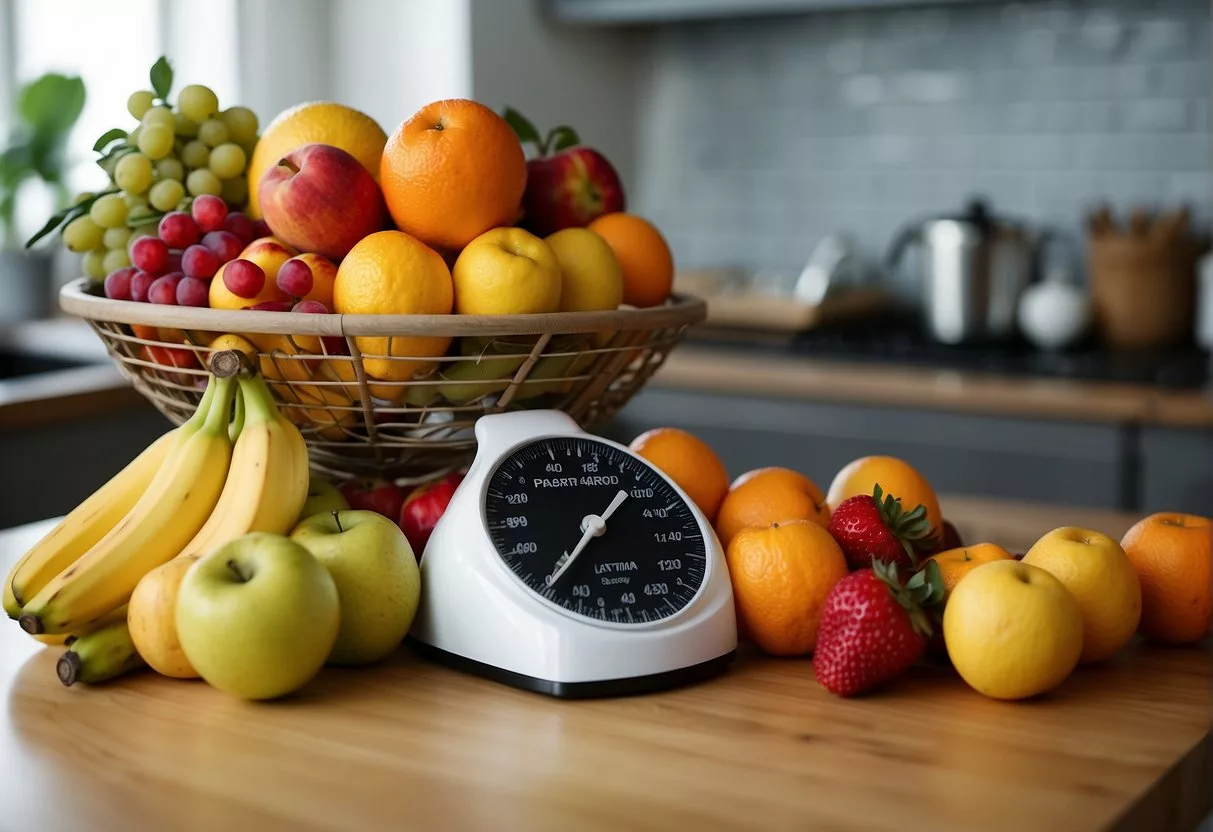
When it comes to weight loss, there are several lifestyle factors to consider in addition to diet and exercise. These lifestyle factors can have a significant impact on metabolism, hunger, and overall success in achieving healthy weight loss.
Physical Activity and Weight Management
Physical activity is an essential component of weight management. Exercise helps to increase metabolism, burn calories, and build lean muscle mass, which can help to boost weight loss efforts. Incorporating regular exercise into a weight loss plan can also help to improve overall health and reduce the risk of chronic diseases.
Stress Management and Eating Habits
Stress can have a significant impact on eating habits and weight management. When under stress, many people turn to food for comfort, which can lead to overeating and weight gain. Developing healthy stress management techniques, such as meditation or yoga, can help to reduce stress levels and improve eating habits.
The Role of Sleep in Weight Loss
Getting adequate sleep is essential for weight loss and overall health. Lack of sleep can disrupt metabolism, increase hunger, and lead to weight gain. Aim for at least seven hours of sleep per night to support healthy weight loss efforts.
Consulting Experts for Personalized Advice
Consulting with a dietitian or other nutrition expert can provide personalized advice and support for weight loss efforts. These experts can help to develop a customized nutrition plan based on individual needs and goals, as well as provide guidance on healthy eating habits and lifestyle factors that can impact weight loss success.
Conclusion
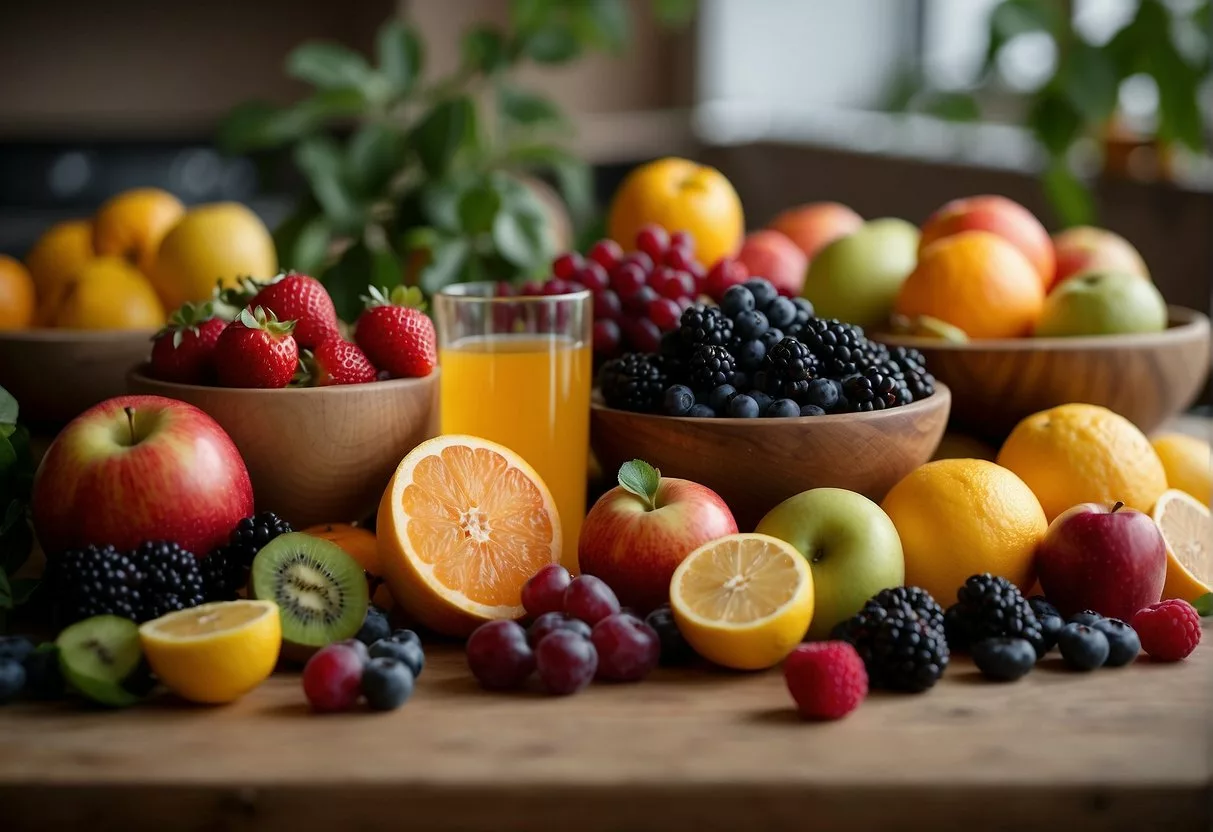
In conclusion, incorporating fruits into one’s diet can be an effective way to support weight loss and overall health. Fruits are low in calories and high in fiber, vitamins, and minerals, making them a nutritious choice for those looking to maintain a healthy weight.
While no single fruit is a magic bullet for weight loss, incorporating a variety of fruits into one’s diet can help support a healthy lifestyle. Fruits such as berries, apples, and citrus fruits are particularly high in fiber and antioxidants, which can help support a healthy immune system and overall health.
It is important to note that while fruits can be a healthy addition to one’s diet, they should not be relied upon as the sole means of achieving weight loss or maintaining a healthy weight. Lifestyle changes such as regular exercise and a balanced diet are also important factors in achieving and maintaining a healthy weight.
Overall, incorporating a variety of fruits into one’s diet can be a simple and effective way to support weight loss and overall health. By making small changes to one’s diet and lifestyle, individuals can work towards achieving and maintaining a healthy weight and improving their overall health.
Frequently Asked Questions

What fruits are considered the most effective for burning fat?
Fruits that are low in calories and high in fiber are considered the most effective for burning fat. Some of the best fruits for weight loss include grapefruit, berries, apples, pears, oranges, and kiwi. These fruits are rich in fiber and nutrients that help to keep you full for longer periods, which can help to reduce overall calorie intake.
Which specific fruits can aid in reducing belly fat?
Some specific fruits that can aid in reducing belly fat include berries, grapefruit, apples, and pears. These fruits are high in fiber and low in calories, which helps to reduce overall calorie intake and promote weight loss. Additionally, these fruits are rich in antioxidants, which can help to reduce inflammation and improve overall health.
Can you list the top fruits recommended for a weight loss diet?
The top fruits recommended for a weight loss diet include grapefruit, berries, apples, pears, oranges, kiwi, and melons. These fruits are low in calories and high in fiber, which helps to reduce overall calorie intake and promote weight loss. Additionally, these fruits are rich in nutrients and antioxidants, which can help to improve overall health.
Are there any fruits that should be avoided when trying to lose weight?
Fruits that are high in sugar and calories should be avoided when trying to lose weight. Some examples of fruits to avoid include bananas, mangoes, pineapples, and grapes. These fruits are high in sugar and calories, which can lead to weight gain if consumed in excess.
How do fruits contribute to weight loss and improved skin health?
Fruits contribute to weight loss by providing a low-calorie, high-fiber alternative to other high-calorie foods. Additionally, fruits are rich in nutrients and antioxidants, which can help to improve overall health and reduce inflammation. Fruits also contribute to improved skin health by providing essential vitamins and minerals that support healthy skin.
Is it beneficial to include fruits in your nightly diet for weight loss purposes?
Yes, it is beneficial to include fruits in your nightly diet for weight loss purposes. Fruits are low in calories and high in fiber, which helps to reduce overall calorie intake and promote weight loss. Additionally, including fruits in your nightly diet can help to reduce late-night snacking and promote better sleep.